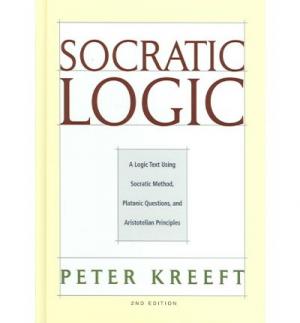BY Peter Kreeft
BOOK DESCRIPTION

Please provide some content.
BOOK SUMMARY
All of logic in two pages: an Overview (B)
This is one of the shortest and simplest sections in this book, but it is also one of the most important, for it is the foundation for everything else in logic. If you do not understand it clearly, you will be hopelessly confused later on. (It is explained in more detail in the next section, Section 5.)
The ancient philosophers defined Man as the “rational animal.” To be human is (among other things) to reason, to give reasons for believing things to be true.
We can see common forms, or structures, in all human reasoning, no matter what the contents, or objects, that we reason about. Logic studies those StructureS.
The fundamental structure of all reasoning is the movement of the mind from premises to a conclusion. The conclusion is what you are trying to prove to be true; the premises are the reasons or evidence for the truth of the conclusion.
The two basic kinds of reasoning are inductive and deductive. Inductive reasoning reasons from particular premises (e.g. “I’m mortal” and “You’re mortal” and “He’s mortal” and “She's mortal”), usually to a more general or universal conclusion (e.g. "All men are mortal'). Deductive reasoning reasons from at least one general, or universal premise (e.g. "All men are mortal”) usually to a more particular conclusion (e.g. “I am mortal”). Inductive reasoning yields only probability, not certainty. (It is not certain that all men are mortal merely on the basis that four men, or 4 million, are.) Deductive reasoning, when correct, yields certainty. (It is certain that if all men are mortal, and if I am a man, then I am mortal.)
A deductive argument Succeeds in proving its conclusion to be true if and only if three conditions are met. These are the three check points of any deductive argument.
(1) First, all the terms must be clear and unambiguous. If a term is ambiguous, it should be defined, to make it clear. Otherwise, the two parties to the argument may think they are talking about the same thing when they are not.
(2) Second, all the premises must be true. You can (seem to) “prove” anything from false premises: e.g. “All Martians are infallible, and I am a Martian, therefore I am infallible.”
(3) Third, the argument must be logically valid. That is, the conclusion must necessarily follow from the premises, so that if the premises are true, then the conclusion must be true.
(1) A “term” in logic is the subject or the predicate of a proposition (a declarative sentence). Terms are either clear or unclear. Terms cannot be either true or false. E.g. “mortal” is neither true nor false. The proposition "All men are mortal” is true, and the proposition “Some men are not mortal' is false.
(2) Propositions are declarative sentences. They are either true or false. "True,” in commonsense usage, means “corresponding to reality,” and “false' means the opposite. There is no one simple and infallible way of telling whether any proposition is true or false.
(3) There is, however, a fairly simple and truly infallible way of telling whether an argument is valid or invalid: the laws of logic, which you will learn in this book.
A deductive argument is logically valid if its conclusion necessarily follows from its premises, invalid if it does not. There are various forms of argument, and each form has its own inherent rules for validity. All the rules for each form of argument are natural to that form of argument and to the human mind. If at any point in this book you think that any of its logical laws contradict what you already implicitly know by innate common sense, please stop and check; for you must be misunderstanding either the laws of logic or what you think common sense tells you, for logic does nothing more than make explicit the rules everyone knows innately by common sense. Arguments are made up of propositions (premises and a conclusion), and propositions are made up of terms (subject and predicate). Terms are either clear or unclear. Propositions (whether premises or the conclusion) are either true or false. Arguments are either logically valid or invalid. Only terms can be clear or unclear; only propositions can be true or false; only arguments can be logically valid or invalid. So the three questions you should habitually ask of yourself when Writing or speaking, and of others when you are reading or listening to them, are:
(1) Are the terms all clear and unambiguous? (2) Are the premises all true? (3) Is the reasoning all logically valid?
If the answer to all three of these questions is Yes, then the conclusion of the argument must be true.
So in order to disagree with any conclusion, you must show that there is either (1) an ambiguous term, or (2) a false premise, or (3) a logical fallacy in the argument such that the conclusion does not necessarily follow from the premises. (You will soon learn the rules for judging that.) If you cannot do any of these three things, then honesty demands that you admit that the conclusion has been proved to be true. (All this applies to deductive arguments only; inductive arguments do not claim certainty.
Kreeft, P., & Dougherty, T. (2005). Socratic logic: A logic text using Socratic method, Platonic questions, and Aristotelian principles (2nd ed.). South Bend, IN: St. Augustine’s Press. Pages 26-27.
BIBLIOGRAPHIC REFERENCE
Peter Kreeft. Socratic Logic, Indiana, United States:St. Augustine's Press, 2005
ISBN
978-1587318009
